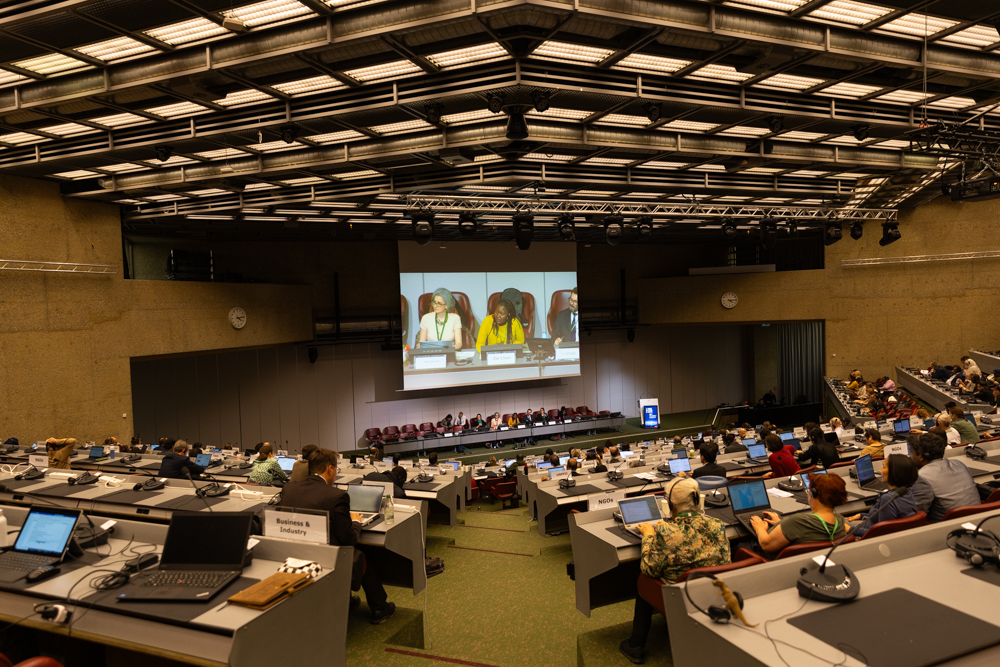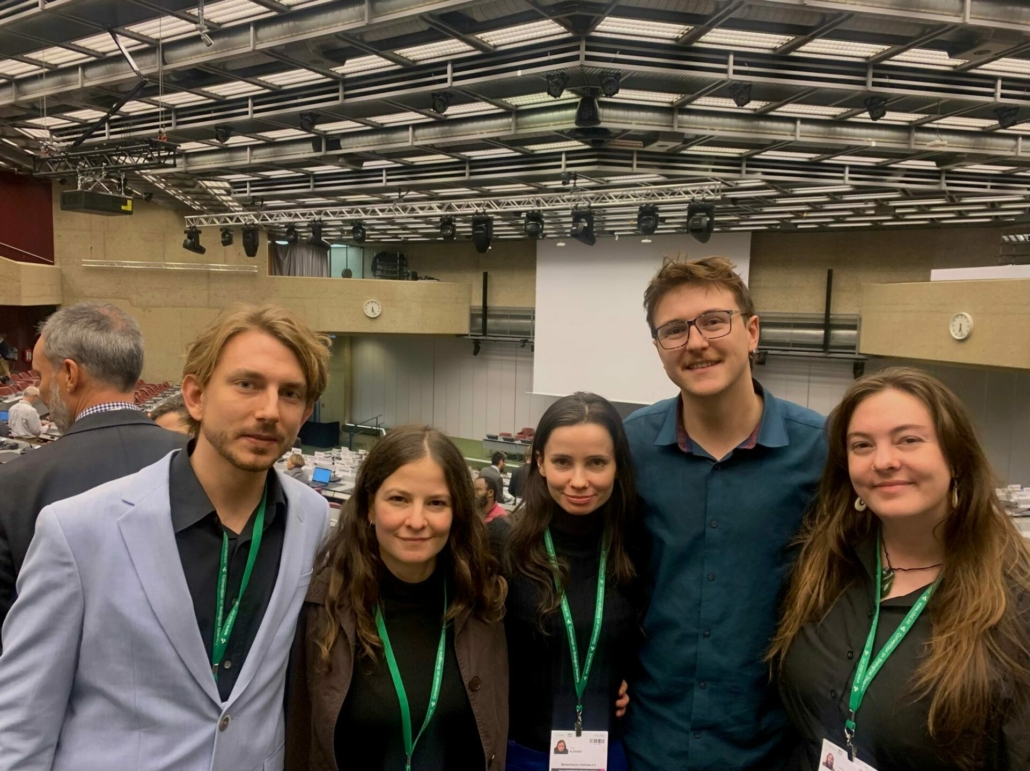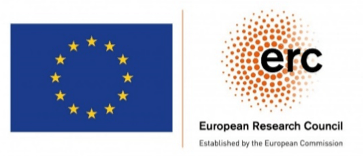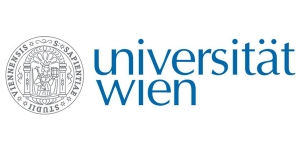iDSI’s Reflections on the CBD’s Open-Ended Working Group on DSI: Discussions on Benefit-Sharing and Data Governance
By Paul Dunshirn, Ayşegül Sırakaya, Adam McCarthy, and Irma Klünker.
This blog post summarizes and reflects on discussions at the Convention on Biological Diversity’s (CBD) first meeting of the Ad Hoc Open-ended Working Group on Benefit-sharing from the Use of Digital Sequence Information (DSI) on Genetic Resources, which took place on November 14-18 in Geneva. It explores some of the key issues under negotiation, namely whether benefit-sharing on DSI should be mandatory or voluntary, how benefit-sharing contributions and modalities should be assessed, and how the multilateral mechanism should interact with other genetic resource governance regimes. The post was written collaboratively by members of the group Interdisciplinary Researchers Working on DSI (iDSI), who are also affiliated with the ERC-funded research project MARIPOLDATA, the Research Platform Governance of Digital Practices, the Manchester Institute of Innovation Research, The Weizenbaum Institute, Lund University and the Natural History Museum.

Parties and observers to the CBD convene to negotiate benefit-sharing from the use of DSI in Geneva (https://enb.iisd.org/).
Introduction
Decision 15/9 of the Conference of the Parties to the CBD (COP Decision 15/9), agreed in December 2022, constituted an important signpost in bringing genetic resource governance to the digital age. Until then, it was disputed whether access to and benefit-sharing from the utilization of DSI, a placeholder term for various types of genetic sequence data, should be considered alongside genetic materials under the auspices of the CBD. However, since considerable scientific and commercial value is produced once DSI are abstracted from material samples, Parties decided that a new multilateral benefit-sharing mechanism on the use of DSI shall be developed until the next Conference of the Parties (COP 16) (COP Decision 15/9, para. 16), to be held in 2024. The decision also initiated an open-ended working group to negotiate whether and if so, how the multilateral benefit-sharing system could operate under the CBD, which had its first meeting on November 14-18 in Geneva.
This decision was generally received as a major step forward, but it quickly became clear during the Geneva meeting that some fundamental questions about the nature of the mechanism are yet to be resolved. This is visible in the formulations used by the Secretariat in various versions of the negotiation document: while at the start of the meeting, the discussed non-papers described areas where ‘we heard agreement’, the final document merely outlines ‘elements on which there is potential convergence’. Additionally, many important issues remain marked by divergences, and were placed under issues ‘for further discussion’. Considering the lack of concrete progress in the negotiations on the future benefit-sharing system, it is highly relevant to explore which issues are currently on the agenda and how the discussions are likely to proceed in the upcoming months.
Voluntary vs. mandatory
A central discussion point was whether the benefit-sharing mechanism on DSI should be voluntary or mandatory. Parties in favor of mandatory provisions argued that established voluntary systems have not provided substantial benefits in the past. There was a lack of clarity on what could constitute a voluntary benefit-sharing mechanism but Parties and stakeholders often used the voluntary contributions to the benefit-sharing fund of the International Treaty on Plant Genetic Resources for Food and Agriculture (‘Plant Treaty’) as a point of reference. Some Parties emphasized the need to introduce legally binding forms of benefit-sharing to ensure a system of rights-based transactions rather than of charity payments.
Proponents of a voluntary system argued that the envisioned CBD system may not be comparable to other specialized mechanisms as its scope (i.e. the types of DSI covered) could be much wider. Some argued that a mandatory system would require a new Treaty to be negotiated, while a voluntary system could more rapidly be established under existing frameworks.
Overall, the meeting yielded minimal progress regarding the voluntary versus mandatory question, a sentiment that is reflected in the final document. It states that there is a need for further discussion on ‘How obligations for sharing the benefits […] can be created; whether this would facilitate a predictable level of contributions and fairness […], and whether this could be done through a legally binding instrument or a non-legally binding framework’. (para. 9). Some Parties supported starting with a voluntary framework and to transition into a more detailed or mandatory system in the future. It appears that such a ‘two-phase’ solution constitutes a potential area of convergence, which would to some extent resemble the benefit-sharing approach taken under the recently decided Treaty on Biodiversity Beyond National Jurisdiction (BBNJ).
Here it should be noted that the establishment of a legally binding/mandatory mechanism is generally understood to require enacting Article 10 of the Nagoya Protocol, which is the CBD’s central protocol for regulating access and benefit-sharing. Article 10 was specifically negotiated to enable the establishment of a multilateral benefit-sharing mechanism through future negotiations during a time when more consensus was available and modalities were clarified. However, the majority of the Parties, rightsholders and stakeholders are attempting to reach a mechanism through the CBD without enacting the Nagoya Protocol.
Triggers and modalities for benefit-sharing
Another important discussion point was how benefit-sharing would be triggered and how benefits to be shared or received should be assessed. Parties deliberated on a wide range of potential triggers for benefit-sharing, such as ‘use of DSI’, commercialization involving DSI, ‘database-related’, or ‘time-based’ triggers, without convergence. A related question was whether a voluntary system would require triggers, which in the end was also included in the final document under issues for further discussion (para. 5). In discussing the various options, delegates repeatedly emphasized the need for conceptual clarification, for example on how ‘use of DSI’ may be defined (e.g. access to DSI, scientific use, or commercialization). At times, the lack of conceptual clarity seemed to make it difficult for Parties to formulate clear statements on positions to be negotiated.
Next to the potential triggers, the modalities for benefit-sharing had to be discussed. While it remained inconclusive, there appeared to be agreement amongst most Parties that ‘commercialization’ should be taken into account when assessing benefits to be shared and that all actors engaging in commercialising products or processes through the utilisation of genetic resources should contribute to the multilateral system. However, it remains unclear how this should be operationalized in practice and statements remained abstract while touching on a range of options for identifying relevant actors, products, and intellectual property rights. Some Parties suggested avoiding the term commercialization and formulating more precisely as ‘generation of value’, ‘shares of incomes’ or ‘sales’ from the use of DSI to have more concrete discussions. Additionally, some concerns have been raised regarding the lack of knowledge on how to value the biobased product sector which, according to some Parties and stakeholders, results in a lack of transparency in the amounts to be captured, generated and disbursed through the fund. These issues remain unresolved.
Geographic information of DSI origin has been on the table for some time as a potentially important modality to assess benefit-sharing, as it resembles the notion of ‘provider country’ under the Nagoya Protocol. However, some Parties and observers argued that it is not a reliable source of information for the multilateral system on DSI, as many types of DSI (such as proteins) are detached from original samples to the extent that they do not allow for identification of geographic origin. Other arguments against such an indicator are that tracing connections of various types of DSI to original samples would require an extensive track-and-trace system, which has been deemed ‘not practical’ for ‘all DSI’ under CBD decision 15/9 (para. 5).
Other potential benefit-sharing modalities included:
- Competitive project applications, which also relates to arguments about ‘absorption capacity’: Several Parties argued that funds should be allocated based on competitive project applications, possibly specified to serve conservation aims. Others opposed this notion, arguing that competitive applications would disadvantage certain countries or Indigenous Peoples and local communities (IPLCs).
- Biodiversity richness: Some Parties argued that biodiversity-rich countries should receive comparatively more funding via the multilateral mechanism, to support local conservation measures
- IPLCs: Some Parties argued that IPLCs should have preferential access to funds, which they should be able to access either directly or via national institutions – views on this question diverged. This approach demonstrated a divergence from the approach during COP 15 as the negotiations in Montreal specifically recognised the IPLCs as primary beneficiaries (COP Decision 15/9, para. 10).
Interactions with other Frameworks
DSI is currently being negotiated under several international fora, namely the Food And Agricultural Organisation (FAO), World Health Organisation (WHO), and World Intellectual Property Organisation. Adopted in June 2023, the BBNJ Treaty constitutes the first legally binding instrument to include DSI in its provisions on marine genetic resources. As such, there is a heightened interest in how the CBD is going to design its multilateral DSI mechanism.
However, interactions with other frameworks did not appear to be high on the agenda for negotiators at the Geneva Meetings. Some discussion took place on the idea of establishing an inter-forum body on access and benefit-sharing to facilitate coordination. While this was placed under areas of agreement in initial non-paper documents, it was moved to further issues of discussion after some Parties objected. While it is generally uncontested that some form of harmonization across existing and future access and benefit-sharing mechanisms would be useful, during the Geneva Meetings some Parties and stakeholders also pointed out that these arenas are independent legal frameworks that cannot simply be replaced by a new harmonized one nor be forced to adjust to terms defined by the CBD.
It should be noted that the discussions on relationships with other bodies are partially shaped by tensions within the CBD, namely on how the multilateral mechanisms on DSI would interact with the Nagoya Protocol. Some Parties made statements to suggest they see the new multilateral system as potentially undermining the sovereign rights of states recognised under Article 15 of the CBD as well as Articles 4 and 6 of the Nagoya Protocol.
iDSI emphasizes the importance of Open and Responsible Data Governance in managing DSI
The group Interdisciplinary Researchers Working on DSI (iDSI) made several interventions during the Geneva meeting concerning interactions with other benefit-sharing frameworks. iDSI highlighted the need to develop principles for Open and Responsible Data Governance (ORDG) and integrate them into the evolving multilateral system. The idea of ORDG is to promote guidelines for practitioners on how to nurture fair and equitable DSI use while managing DSI according to the FAIR principles (findable, accessible, interoperable, and reusable). Given the potential transformation of bilateral access processes into multilateral ones, iDSI emphasized the importance of providing practitioners with explicit guidance on avoiding ethical breaches and the infringement of pre-existing rights and obligations in their routine use of DSI. Such guidelines may simplify researchers’ navigation through the complex landscape of benefit-sharing mechanisms while jumpstarting the implementation of international law on the ground.

Interdisciplinary Researchers Working on DSI (iDSI) at the Geneva Open-Ended Working Group Meeting.
Next steps and conclusion
To summarize, delegates and observers are faced with a substantial workload in the upcoming months as they endeavor to discern the future configuration of the multilateral benefit-sharing system for DSI. As highlighted in this blog, the main points of negotiations are whether the mechanisms will entail voluntary or mandatory provisions, how the trigger points and assessment criteria are designed, and how the new mechanism will relate to existing legal frameworks. A fundamental question underlying these considerations is how to align principles of open science with the rights of provider countries and IPLCs under the umbrella of a new multilateral system.
In terms of the next steps, many actors emphasized that they await the results of studies requested under decision 15/9 (para. 22). It was also agreed that an Informal Advisory Group (IAG) will be set up, to meet every month leading up to the second meeting of the Ad-Hoc Open-Ended Working Group on DSI in August 2024, in time for the next COP 16 scheduled for October 2024. The IAG nomination and acceptance process is ongoing and likely to be relatively closed, with selection based on “pertinence” (IAG notification).
iDSI will continue to engage in this process, and is open to discuss our perspectives on any of the issues touched on above. Please feel free to contact us at idsi.research@gmail.com.


